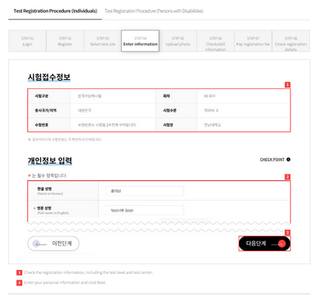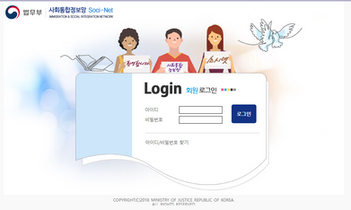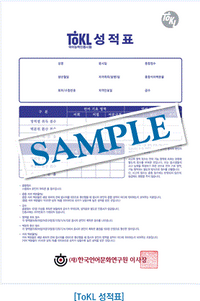Types of Korean Language Tests
- FLip Korea

- Feb 16, 2023
- 5 min read
Updated: Apr 30, 2025
A lot of foreigners were wondering if they need a Korean language test to study or work in Korea, and in most cases you do. Some of the tests you can take are listed down below. From the well most known, that you can pass even in your own country, until the most professional one.
TOPIK test
The objective of the Test
To assist individuals teaching Korean as a second language and encourage more people to utilize Korean. To determine each test taker's level of Korean language ability and to enable them to use their exam results when applying for jobs, colleges, etc.
Eligibility
Any overseas Korean or non-Korean who does not speak Korean as their first language and is learning the language now plans to enroll in a Korean university or aspires to work for a Korean firm or government agency with offices within or outside of Korea.
A citizen of Korea who has either completed their studies overseas or is currently enrolled there.
Validity Period (TOPIK Score)
Valid for two years following the announcement of the test result.
Potentially beneficial for
Serving as the prerequisite for entrance and graduation at Korean universities. Applying to companies and government organizations both domestically and internationally. Obtaining a visa to meet requirements for employment and permanent residence, etc. Enrolling in courses under the Global Korean Scholarship (GKS) program, to fulfill graduation requirements for Korean majors in foreign universities.
Registration fee (in Korea) :
TOPIK I : KRW 40,000
TOPIK II : KRW 55,000
TOPIK host organization:
1. Address:
13557 경기도 성남시 분당구 정자일로 191
#191 Jeongjail-ro, Bundang-gu, Seongnam-si, Gyeonggi, Republic of Korea, 13557
2. Tel.: 02-3668-1331 팩스(FAX):02-741-7408
3. Email:topik@korea.kr
How to apply:
You should enter the website above and choose English. Then follow the pictures below for a guideline.
Credits: Topik website

Below you have the steps to register and print the exam identification slip.
KIIP
Korea Immigration & Integration Program (KIIP) program's objective is to assist foreigners in learning the fundamentals of Korean culture and language so they can integrate into Korean society as independent members.
Who may take an interest?
Foreigners living in Korea who wish to get a status of sojourn, such as citizenship or permanent residency, and those who have not yet attained nationality for three years.
Benefits: Exemption from the written test and interview for naturalization
Which courses are offered?
Levels 0–4 of Korean language and culture *
Level is determined by the level exam.
Understanding of Korean society
70 hours are required to obtain nationality; 50 hours are required to obtain permanent residency.
💰 KIIP Tuition Fees (Effective 2025)
Level 0 (Introductory, 15 hours): Free
Levels 1–4 (100 hours each): 100,000 KRW per level
Level 5 Basic Course (70 hours): 70,000 KRW
Level 5 Advanced Course (30 hours): 30,000 KRW
A pre-test is a placement test used to place applicants in the appropriate program level and several hours by determining how proficient they are in Korean. To be assigned to the appropriate level and hours, any participant in the Comprehensive Social Programs may take the pre-test.
Testing Places
Seoul, Busan, Incheon, Suwon, Jeju, Daegu, Daejeon, Yeosu, Yangju, Gwangju, Changwon, Jeonju, Chuncheon, Cheongju, and Ulsan are among the 15 cities where tests can be taken. When applying, candidates can look up the test location on the registration sheet (tests may be canceled in some places.)
They only accept online applications for the basic test; they do not accept applications received in person or by mail.
The cost of the test is 30,000 KRW (including VAT)
Test reports can only be printed online; they cannot be faxed, mailed, or emailed for security reasons.
***Note: applicants who want to participate from level 0 may be exempted from the level test
Application Period
All schedules will be posted online.
Please apply in advance as the Server may be overcrowded on the last day.
※ We do not accept any applications past the application date, so please apply during the application period.
How can I apply?
Register as a member on Socinet (www.socinet.go.kr ), apply for the Korea Immigration & Integration Program, and take the level test
KBS한국어능력시험
The Korean Language Promotion Agency, a division of the Korea Broadcasting Corporation (KBS), is in charge of hosting and monitoring the test, which assesses proficiency in using Korean as a mother tongue.
The sole nationally recognized Korean language proficiency test in Korea at the moment is the Korean language proficiency certification test, which is no longer valid after 2020.
There is a two-year window for certification, just with ToKL. Up until 2021, it was deployed four times a year, four times quarterly, and starting in 2022, six times a year.
The test is open to everyone, however, foreigners can only take it if they have an alien registration card or a domestic resident report.
The test fee is 33,000 won.

Website: http://klt.modnexam.com/
Online Test Center Customer Center
Weekday AM 10 - PM 6
Lunchtime PM 1 - 2
Closed on weekends and holidays
Online exam and system inquiry
070-7826-1400
Item errors and content inquiries
02-781-8797
TOKL - The Korean Language Proficiency Certification Test
The Korean Language and Culture Research Institute administers the Korean Language Proficiency Certification Test to students and non-academics who speak Korean as their first language to assess their overall proficiency in the language.
Its short form, ToKL, is the same as its English name, "Test of Korean Language." It emphasizes thorough understanding, reasoning, and critical and creative thinking through the Korean language, as opposed to other Korean language exams that simply examine fundamental language skills and focus on knowledge of the Korean language, Korean language culture, and grammar.
Comprehensive Korean language proficiency, practical Korean language proficiency, rational communication capacity, audio expression ability, and flexible language situation adaptability are the objectives of the evaluation.
It is divided into listening, reading, and writing) and thinking skills (understanding, reasoning, criticism, creativity).
As of October 8, 2009, it was run as a privately administered national qualification test; however, as a result of the Ministry of Culture, Sports, and Tourism's re-accreditation assessment, the national qualification was lost as of January 1, 2020. Accordingly, the national accreditation qualification has been lost as of the 100th exam, which was administered on January 17, 2020. The Korean Language and Culture Research Institute stated that even though there isn't currently a nationally recognized qualification, the examination will go on as usual. The institute intends to ask the Ministry of Culture, Sports, and Tourism to reevaluate the nationally recognized qualification.
The cost of the exam is 38,000 won.
However, if a group of people registers together, the needed amount is 35,000 won.
Evaluation target
- Students and the general public who speak Korean as a first language
Evaluation goal
- A thorough assessment of one's proficiency in speaking, listening, reading, and writing Korean
- Evaluate the capacity to communicate logically, to speak clearly, and to adjust your language to different situations. This is a measurement of practical Korean language abilities that are strongly tied to language living.
Korean language proficiency test characteristics (ToKL)
- Create items that evaluate every aspect of thinking, including language function areas as well as understanding, reasoning, criticism, and creativity.
- Assess language thinking skills by developing new problem types, introducing descriptive subjective evaluation, and varying text formats.
Assessment Methods
- Test period: 1st period 60 minutes, 2nd period 70 minutes (total 130 minutes, listening test 30 minutes)
- Question composition: [Number of questions] 90 questions
[Type] 80-minute multiple-choice questions (5 choices, 10 short-term questions)
- Question allocation: [total points] 200 points (multiple choice 2 points - equal points, subjective type 4 points - differential points)
Test administration
- 6 times per year
- Application registration: www.tokl.or.kr
- Place of Implementation: Major cities across the country
- Application fee: 38,000 won
This is the list of Korean language exams, even though not all can be passed by foreigners we wanted to make sure people have all the information needed to make a good decision.
Good luck with your test!









































Comments